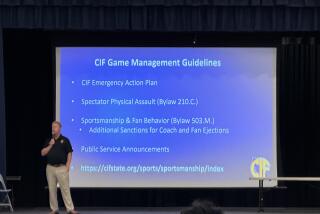CIF Is Expected to Back Measures
- Share via
The California Interscholastic Federation is expected to send a strong message discouraging the use of steroids when the Federated Council votes today in Irvine on three proposals related to performance-enhancing supplements.
The state’s 10 athletic sections, according to preliminary surveys, will nearly unanimously approve measures that:
* Require high schools to implement written anti-steroid policies.
* Mandate education about steroids for coaches.
* Define supplements that are permissible for coaches and school personnel to distribute and those that are acceptable as sponsors for athletic teams.
The proposals are part of a continuing campaign against steroid use, which high school administrators say has trickled down from professional sports to high schools during the last decade.
Experts estimate that 3% to 10% of high school athletes have tried steroids. In California, where there are approximately 700,000 high school athletes, that means from 21,000 to 70,000 teenagers are “juicing up.”
“Any percentage is bad news,” said Jim Staunton, commissioner of the Southern Section, the state’s largest. “We need to get the message out that these are dangerous drugs that can have lifelong effects.”
Implementing the policies is a huge step forward, but hurdles remain. Penalties for violations have yet to be determined, and policing the nearly 1,400 schools in California could be a daunting task.
“The most important thing is putting a policy in place,” Staunton said.
Widespread testing in California is unlikely because a single test can cost $100 or more.
But, Staunton said, education programs would help coaches spot symptoms of steroid use and make them better-equipped to deal with the athlete.
“We would have coaches actively telling athletes to stay away [from steroids],” Staunton said. “I can’t believe anyone would in good conscience tell a kid to keep using these drugs.”
The CIF is also expected to pass a two-year pilot program for state football bowl games beginning in 2006 and a proposal that implements stricter monitoring of weight-loss practices by wrestlers.
More to Read
Get our high school sports newsletter
Prep Rally is devoted to the SoCal high school sports experience, bringing you scores, stories and a behind-the-scenes look at what makes prep sports so popular.
You may occasionally receive promotional content from the Los Angeles Times.






